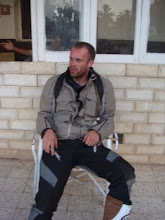I now have my PhD. I defended last week. This person is mostly responsible for any success I've had. I am long in his debt.
I booked a flight from London to Manchester yesterday under Dr. Loewen. This, of course, is the principal reason I finished a PhD. Let's hope that I get an upgrade to business class and let's hope that no one has a heart attack.
Blogging will be light for the next little while as I head off to ride a motorcycle from Cairo to Cape Town before taking up at UBC in August. You can follow the trip here. If you are inspired by our trip you can take part by making a donation to Spread the Net, a great charity for which we've been fundraising . We've raised $15,000 so far and hope to raise $50,000 with the trip. You can donate here.
Sunday, June 29, 2008
Monday, June 16, 2008
Potter Gold
Andrew Potter has a nice and counterintuitive column in this week's Maclean's. Potter argues that negative advertising may not be all bad. He has Warren Kinsella and me in his corner. I am not sure how I would match up in bar fight, but I suspect Warren's a good comrade in arms.
Anyways, it's an article I like, first because of the counterintuitions, but also because Potter cites some of my recent research. The paper is under review, so I won't link to it, but if you'd like a copy email me. In the meantime, here's the abstract:
Some citizens differ in their levels of concern for the supporters of various parties. I demonstrate how such concerns can motivate citizens to vote . I first present a simple formal model which incorporates concern for others and election benefits to explain the decision to vote. By predicting substantial turnout, this model overcomes the “paradox of participation”. I then verify the model empirically. I utilize a series dictator games in an online survey of more than 2000 Canadians to measure the concern of individuals for other partisans. I show how the preferences revealed in these games can predict the decision to vote in the face of several conventional controls. Taken together, the formal model and empirical results generate a more fulsome and satisfactory account of the decision to vote than an explanation which relies solely on duty.
Anyways, it's an article I like, first because of the counterintuitions, but also because Potter cites some of my recent research. The paper is under review, so I won't link to it, but if you'd like a copy email me. In the meantime, here's the abstract:
Some citizens differ in their levels of concern for the supporters of various parties. I demonstrate how such concerns can motivate citizens to vote . I first present a simple formal model which incorporates concern for others and election benefits to explain the decision to vote. By predicting substantial turnout, this model overcomes the “paradox of participation”. I then verify the model empirically. I utilize a series dictator games in an online survey of more than 2000 Canadians to measure the concern of individuals for other partisans. I show how the preferences revealed in these games can predict the decision to vote in the face of several conventional controls. Taken together, the formal model and empirical results generate a more fulsome and satisfactory account of the decision to vote than an explanation which relies solely on duty.
Sunday, June 08, 2008
Small pleasures, Vancouver edition
I am sitting in the lounge at Pearson about to hop on the early flight back to North Bay. I flew the red eye from Vancouver.
I am just coming back from the annual meeting of the Canadian Political Science Association. It was a great time. I stayed with Daniel's" family in Vancouver and we spent a good bit of time checking out the city. I look forward to moving there in September. Indeed, I checked out Green and it looks quite agreeable. And I finished up the visit with dinner at Kits beach with the Cynic in Chief.
As importantly, we held our workshop on experimentation and it was a smashing success. I cannot really say I ever read a representative sample of the work read at the CPSA. A lot of it doesn't interest me to begin with and a lot which does seems a bit old. Experimentation is another story, so I was thrilled to spend a day listening to people talk about their projects and then to hear great academics discuss the work. We finished off with a big dinner at Daniel's house after which James Fowler gave a great talk on genetics and politics. Small pleasures, all.
I am just coming back from the annual meeting of the Canadian Political Science Association. It was a great time. I stayed with Daniel's" family in Vancouver and we spent a good bit of time checking out the city. I look forward to moving there in September. Indeed, I checked out Green and it looks quite agreeable. And I finished up the visit with dinner at Kits beach with the Cynic in Chief.
As importantly, we held our workshop on experimentation and it was a smashing success. I cannot really say I ever read a representative sample of the work read at the CPSA. A lot of it doesn't interest me to begin with and a lot which does seems a bit old. Experimentation is another story, so I was thrilled to spend a day listening to people talk about their projects and then to hear great academics discuss the work. We finished off with a big dinner at Daniel's house after which James Fowler gave a great talk on genetics and politics. Small pleasures, all.
Subscribe to:
Comments (Atom)
